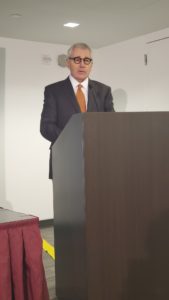
Event Recap: A New American Message
On December 6, the American Security Project (ASP) published a white paper, “A New American Message.” ASP co-founder and former Secretary of Defense Chuck Hagel provided introductory remarks, and a panel of experts discussed the US’ role in the world and how the rest of the world sees the United States. The panelists included Mohamed Younis, Editor in Chief at Gallup News; Dokhi Fassihian, Executive Director of Reporters without Borders; and Dr. John Glenn, Policy Director at the U.S. Global Leadership Coalition. ASP Public Diplomacy Fellow Matthew Wallin wrote the report and moderated the discussion.
 To start, Secretary Hagel noted that the US should not only be concerned about the US’ role in the world, but about everyone’s future; we are all global citizens. By 2050, the world’s population is expected to increase by roughly 2 billion people, making the difficult problems of today that much more difficult. Further, Secretary Hagel noted, the US has lost sight of why the liberal economic order was created in the post-World War II era. The order, Secretary Hagel noted, was created to promote the common interest. If the international community cannot come together in areas where there is a shared interest, it most certainly will not be able to address areas where this is little or no common interest. In closing, Secretary Hagel argued that the world needs consistent and wise American leadership to promote stability and certainty in the world.
To start, Secretary Hagel noted that the US should not only be concerned about the US’ role in the world, but about everyone’s future; we are all global citizens. By 2050, the world’s population is expected to increase by roughly 2 billion people, making the difficult problems of today that much more difficult. Further, Secretary Hagel noted, the US has lost sight of why the liberal economic order was created in the post-World War II era. The order, Secretary Hagel noted, was created to promote the common interest. If the international community cannot come together in areas where there is a shared interest, it most certainly will not be able to address areas where this is little or no common interest. In closing, Secretary Hagel argued that the world needs consistent and wise American leadership to promote stability and certainty in the world.
Matthew Wallin started the panel discussion by defining the American message. Wallin argued that the US has a great message outlined in our founding documents; the issue is how we communicate and apply our message. According to Wallin, the world sees the US berating international institutions, a dysfunctional government, the US’ inability to “win” wars or conflict, and they question the US’ commitment and word. For all these reasons, the US needs to redefine how it promotes itself abroad.
Mohamed Younis focused his remarks on how Americans feel about the US government and position in the world. According to Younis, 76% of Americans believe corruption is widespread in government and 60% of Americans polled have no confidence that the American government can solve domestic problems today. As a point of reference, in 1974, 44% of Americans had no confidence that the government could solve domestic problems. Furthermore, 33% of Americans are satisfied with “the way things are going in the US.” The last time the majority of people were satisfied with the way things were going was 2004.
Dokhi Fassihian emphasized the ways in which freedom of the press is under attack in the US and how that reverberates around the world. The US has long been a champion of a free press; however, according to Fassihian, the US dropped to 48th out of 180 on Reporters Without Borders annual World Press Freedom Index. This is three notches lower than its place last year and downgrades the US from a “satisfactory” place for journalists to a “problematic” one. Additionally, Fassihian noted that the lack of press freedom in the US has global implications. Authoritarian and despotic regimes around the world are now using “fake news” to discredit journalists reporting on or operating in their countries.
Dr. John Glenn argued that what is needed most is more information. According to Dr. Glenn, people throw out information that does not fit into the mental frame they have. In terms of messaging, what is needed is strategic communication. He offered three approaches to framing—national security, economics, and values. The U.S. Global Leadership Coalition has had great success, Dr. Glenn offered, when they use strategic framing.
In conclusion, Wallin offered several recommendations for America’s new message. Some of the recommendations include, the US should not promise something it cannot deliver, the US should actively listen to others, the US must build trust with other countries, and the US must recommit to telling the truth. For more of Wallin’s recommendations, please read the full report.





